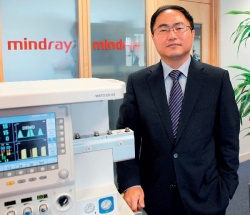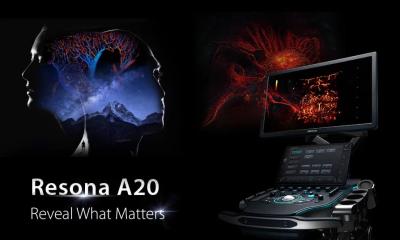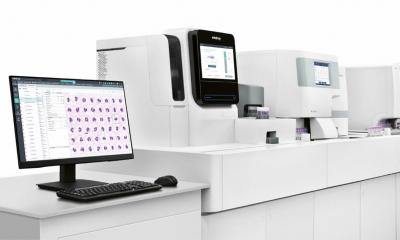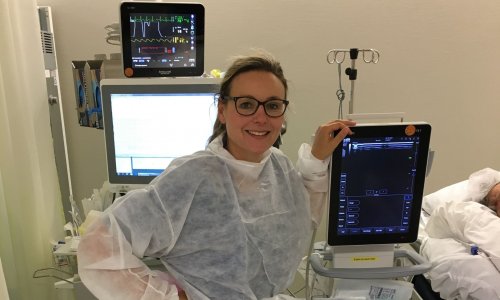Mindray is quick, flexible, highly international and open to all
Founded in 1991 in Shenzhen, China, Mindray is now known internationally for its products that cover patient monitoring and life support, in-vitro diagnostics, medical imaging and veterinary. During Daniela Zimmermann’s interview with David Yin, General Manager of Mindray Europe, he described the firm’s clear strategy for Europe and beyond


‘We want to help European customers to improve healthcare quality by providing them with high-quality innovative and cost-effective products and a very good service team and very good professional clinical support team,’ David Yin of Mindray confirmed. ‘There is competition everywhere, and we are so glad that increasingly European hospitals have accepted us – and also, very importantly, that they are very happy about the product, service and support. This gives us a lot of confidence. We walk very closely with the end-user and customer and medical professionals. ‘We also make many very good installations in university hospitals and city-level hospitals in all of Europe. If you had asked about that about five years ago I couldn’t speak of the big hospitals; but now I can – in every country. That’s very important for us and for the other end-users. They can trust what our product is. A lot of university hospitals do long-term clinical trials of our product. We provide a machine and work on their requirements and import that and send our people there to work closely with the staff doctors.’
Europe differs very much from Asia or America; all the countries are different. How do you cope with the cultural differences?
‘The countries have common requirements: reliability, good quality, good features – so, people like a good product. That’s the same. Mindray is from China and its products are produced in China, but basically, as a first step, that product consolidates all the information from all the countries. The second step: we use local people. In every country, for each office, our general manager is local and knows the customer really well.’ Each manager in each country reports to the General Manager for Europe, he explains. ‘We have six offices in Europe: the Netherlands, France, the United Kingdom, Germany, Italy and Spain. So, all the countries with the offices are our interest, along with others, such as Scandinavian countries.’
All the Scandinavian countries are not even a tenth the size of Germany or France, so, which in Europe is the most interesting for Mindray?
‘Germany is the top.’
Where you have to compete against Siemens…
Not really. Our product line is different from Siemens. We have some products with little overlap. Ultrasound has very little overlap. Patient monitors – I think Siemens had this product line ten years ago but sold it to other companies. It’s what big companies do; because of their structures and size they can do many things. The electronic part, like us with a patient monitor, is quite a faster moving product. In all industries, the price of electronic products is decreasing. ‘Faster reactions and taking the most advantage of electronics technology, a company like us can do it very quickly. This is also important. We are quick and flexible and there’s also innovation. How to make it fast is very important to us. When we understand something, we know the market needs, we can just use the new technology. For other big companies, because the product is already there, if they put out something new, that means the old product will discontinue. So, that is a painful decision. For us, everything is new. We are quite flexible, and we move faster. ‘Maybe 20 or 30 years later we’ll also become bigger. So then, how can we be faster? That is another question, another challenge.’
What are China’s strengths?
In Germany, for example, Siemens’ strength is absolutely high-level engineering. France and Italy are good at design. Does the strength of the Chinese, lie in electronics or engineering?
‘I cannot speak generally about the Chinese, but if we talk about Mindray, we have a very strong engineering team: more than 1,600 engineers among our 7,300 employees, so we are a very big engineering team. We also consolidate resources, knowledge, from outside China. We have R&D centres in the USA and Stockholm and we consolidate all requirements. We also work very closely with our local general managers, people who have a long history in the market and the industry and know customers’ needs. Therefore, they also contribute a lot. We combine everything together. We also have our own design team and win a lot of global design awards.’ Those prizes have included the internationally recognised ‘red dot’ design award in 2011 for the firm’s HyLED operating light; the 2010 red dot award for the M7 diagnostic ultrasound system; China’s iF Design Award in 2009 and, in 2006, the same for its BeneView T8 patient monitor.
So, what’s missing for Mindray?
‘Two things: Because it has become a global company, you need increasing numbers of local people and talented people to join the company. I think everything is related to people, because people are very important: people from China and people outside China. That is the key to being a great company; you must have a lot of excellent people all together.’
Siemens, for example, has engineers from India, China, France, America, Germany, in a multicultural team. Does Mindray also try to employ French, English or German engineers and, say, postgraduates, when they are new and fresh?
In response to this question, a Mindray representative pointed out that the Shenzhen base has grown considerably. ‘You’ll find our colleagues from every country, such as India, Germany, Italy and America. It is really an international company – Mindray is open to everyone.’
25.02.2013
- economy (1046)
- imaging (1640)
- laboratory (1111)
- markets (545)
- monitoring (376)
- surgery (657)
- ultrasound (766)





